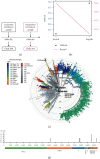First Identification of Reinfection by a Genetically Different Variant of SARS-CoV-2 in a Homeless Person from the Metropolitan Area of Santiago, Chile
- PMID: 35528635
- PMCID: PMC9068328
- DOI: 10.1155/2022/3859071
First Identification of Reinfection by a Genetically Different Variant of SARS-CoV-2 in a Homeless Person from the Metropolitan Area of Santiago, Chile
Abstract
The identification and tracking of SARS-CoV-2 infected patients in the general population are essential components of the global strategy to limit the COVID-19 viral spread, specifically for maintaining traceability and suppressing the resurgence of local outbreaks. Public health programs that include continuous RT-qPCR testing for COVID-19 in the general population, viral sequencing, and genomic surveillance for highly contagious forms of the virus have allowed for the identification of SARS-CoV-2 infections and reinfections. This work identified SARS-CoV-2 reinfection in a homeless person, which occurred 58 days after the first COVID-19 diagnosis. Genomic sequencing identified a different Nextstrain classification clade (20A and 20B) and PANGO lineage, with a divergence of 4 single nucleotide variants (SNVs) in S and ORF1ab genes, suggesting reinfection by different viral variants. This study is the first from the great metropolitan area of Santiago, Chile, one of the top ten countries in the world to live during the COVID-19 pandemic. We support the importance of performing intensive genomic surveillance programs in the whole population and high-risk groups, such as homeless people, nearly 20 thousand people in Chile, and have limited access to health care services and poor viral traceability.
Copyright © 2022 Claudio Acuña-Castillo et al.
Conflict of interest statement
The authors declare no conflicts of interest.
Figures

Similar articles
-
An ecological study on reinfection rates using a large dataset of RT-qPCR tests for SARS-CoV-2 in Santiago of Chile.Front Public Health. 2023 Jul 10;11:1191377. doi: 10.3389/fpubh.2023.1191377. eCollection 2023. Front Public Health. 2023. PMID: 37492136 Free PMC article.
-
Genomic Evidence Suggests Viral Persistence of SARS-CoV-2 for 386 Days in Health Worker: A Case Report from Santiago of Chile.Infect Dis Rep. 2022 Nov 30;14(6):971-978. doi: 10.3390/idr14060096. Infect Dis Rep. 2022. PMID: 36547242 Free PMC article.
-
Occurrence of SARS-CoV-2 reinfections at regular intervals in Ecuador.Front Cell Infect Microbiol. 2022 Sep 9;12:951383. doi: 10.3389/fcimb.2022.951383. eCollection 2022. Front Cell Infect Microbiol. 2022. PMID: 36164552 Free PMC article.
-
The Importance and Challenges of Identifying SARS-CoV-2 Reinfections.J Clin Microbiol. 2021 Mar 19;59(4):e02769-20. doi: 10.1128/JCM.02769-20. Print 2021 Mar 19. J Clin Microbiol. 2021. PMID: 33361342 Free PMC article. Review.
-
[Health of homeless individuals during the COVID-19 pandemic].Bundesgesundheitsblatt Gesundheitsforschung Gesundheitsschutz. 2023 Aug;66(8):882-889. doi: 10.1007/s00103-023-03739-8. Epub 2023 Jul 19. Bundesgesundheitsblatt Gesundheitsforschung Gesundheitsschutz. 2023. PMID: 37466653 Free PMC article. Review. German.
Cited by
-
SARS-CoV-2 Variants Identification: Overview of Molecular Existing Methods.Pathogens. 2022 Sep 17;11(9):1058. doi: 10.3390/pathogens11091058. Pathogens. 2022. PMID: 36145490 Free PMC article. Review.
-
An ecological study on reinfection rates using a large dataset of RT-qPCR tests for SARS-CoV-2 in Santiago of Chile.Front Public Health. 2023 Jul 10;11:1191377. doi: 10.3389/fpubh.2023.1191377. eCollection 2023. Front Public Health. 2023. PMID: 37492136 Free PMC article.
References
-
- World Health Organization. WHO coronavirus (COVID-19) dashboard. 2021. https://covid19.who.int/
-
- Hall V. J., Foulkes S., Charlett A., et al. SARS-CoV-2 infection rates of antibody-positive compared with antibody-negative health-care workers in England: a large, multicentre, prospective cohort study (SIREN) The Lancet . 2021;397(10283):1459–1469. doi: 10.1016/S0140-6736(21)00675-9. - DOI - PMC - PubMed
Publication types
MeSH terms
LinkOut - more resources
Full Text Sources
Medical
Miscellaneous

